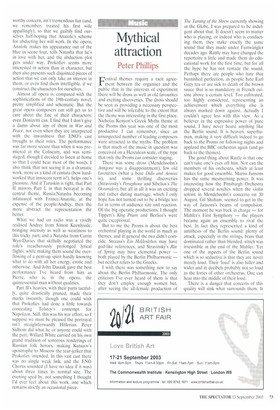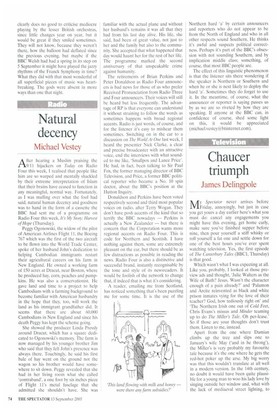Mythical attraction
Peter Phillips
Elestival themes require a tacit agree ment between the organiser and the public that in the interests of experiment there will be dross as well as old favourites and exciting discoveries. The dross should be seen as providing a necessary perspective and will be tolerable to the extent that the theme was interesting in the first place. Nicholas Kenyon's Greek Myths theme at the Proms this year was one of the most productive I can remember, since an unsuspected number of leading composers were attracted to the myths. The problem is that much of the music in question was conceived on a Herculean scale, of the type that only the Proms can consider staging.
There was some dross (Mendelssohn's Antigone was a disappointment), few old favourites (what a bore Dido and Aeneas is), and some thrilling discoveries (Stravinsky's Persephone and Sibelius's The Oceanides); but all in all it was an exciting and rather daring marriage, which I only hope has not turned out to be a bridge too far in terms of audience size and reaction. Of the big operatic productions. I thought Tippett's King Priam and Berlioz's were quite exceptional.
But to me the Proms is about the best orchestral playing in the world as much as themes, and in general the two didn't coincide. Strauss's EM Heidenleben may have god-like references, and Stravinsky's Rite of Spring may have elemental power — both played by the Berlin Philharmonic — but neither refers to the Greeks.
I wish there was something new to say about the Berlin Philharmonic. The only criticism I've ever heard of them is that they don't employ enough women but, after seeing the all-female production of The Taming of the Shrew currently showing at the Globe, I was prepared to be indulgent about that. It doesn't seem to matter who is playing, or indeed who is conducting them, they make exactly the same sound that they made under Furtwangler decades ago. Rattle may have changed the repertoire a little and made them do educational work for the first time, but for all the hype he has not remade the sound. Perhaps there are people who hate that burnished perfection, as people hate Earl Grey tea or are sick to death of the brown sauce that is so mandatory in French cuisine above a certain level. Too cultivated, too highly considered, representing an achievement which everything else is always marked down against. Actually I couldn't agree less with this view. As a believer in the expressive power of pure sound, I have never heard anything like the Berlin sound. It is heaven, superhuman, making it very difficult indeed to go back to the Proms on following nights and applaud the BBC orchestras again (and go back to the themes).
The good thing about Rattle is that one can't take one's eyes off him. Nor can the members of his orchestra, which at least makes for good ensemble. Mariss Jansons has the same mesmerising power. It was interesting how the Pittsburgh Orchestra dropped several notches when the violin soloist in Mendelssohn's concerto on 30 August, Gil Shaham, seemed to get in the way of Jansons's beams of compulsion. The moment he was back in charge — for Mahler's First Symphony — the players became again an ensemble to rival the best. In fact they represented a kind of antithesis of the Berlin sound: plenty of attack, especially in the strings, brass that dominated rather than blended, which was irresistible at the end of the Mahler. Yet one of the aspects of the Berlin sound which is so seductive is that they are never merely loud. Their 'loud' is also fuller and wider and in decibels probably not so loud as the fortes of other orchestras. One can hear into the middle of their loud.
There is a danger that concerts of this quality will sink what surrounds them. It clearly does no good to criticise mediocre playing by the lesser British orchestras, since little changes year on year, but it would be great if they smiled sometimes. They will not know, because they weren't there, how the balloon had deflated since the previous evening, but maybe if the BBC Welsh had had a spring in its step on 5 September it might have played the jazzy rhythms of the Franck Symphony in time? What they did with that most wonderful of all superficial pieces of music was heartbreaking. The gods were absent in more ways than one that night.



























































































 Previous page
Previous page